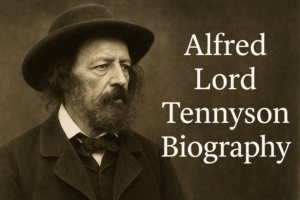Introduction
Alfred Lord Tennyson (1809–1892) was one of the greatest poets of the Victorian era, celebrated for his lyrical mastery and emotional depth. Born on August 6, 1809, in Somersby, Lincolnshire, England, Tennyson was the fourth of twelve children in a talented but troubled family. His father, George Tennyson, was a clergyman who suffered from mental illness, which deeply affected Alfred’s early years and later influenced the melancholic tone of his poetry.
Tennyson showed literary talent from a young age, writing poems as a child and publishing his first collection, Poems by Two Brothers, in 1827 with his siblings. He attended Trinity College, Cambridge, where he became friends with Arthur Henry Hallam, whose untimely death later inspired one of Tennyson’s most famous works, In Memoriam A.H.H.

Early Life and Career
The biography of poet Alfred Lord Tennyson reflects a journey filled with both struggle and triumph. His early collections, such as Poems, Chiefly Lyrical (1830), received mixed reviews, but his later works gained wide acclaim for their beauty and emotional resonance. The death of Hallam profoundly influenced his poetry, leading to themes of loss, faith, and the human struggle for meaning.
In 1850, Tennyson published In Memoriam A.H.H., which brought him national recognition and established him as a major voice of his time. That same year, he married Emily Sellwood and was appointed Poet Laureate of England, a position he held for over four decades.
Major Works and Achievements
Among Tennyson’s most celebrated poems are The Lady of Shalott, Ulysses, The Charge of the Light Brigade, and Crossing the Bar. His works often blend classical mythology with Victorian ideals, exploring themes of courage, loss, and the quest for faith in an age of doubt.
His mastery of rhythm, imagery, and emotional expression made him one of the most influential figures in English literature. Readers seeking a short biography of Alfred Lord Tennyson can summarize his legacy as a poet who gave voice to the spirit and struggles of Victorian England.
Later Life and Legacy
Tennyson spent his later years in the Isle of Wight, continuing to write until his death on October 6, 1892. He was buried in Westminster Abbey’s Poets’ Corner, an honor reserved for Britain’s most distinguished writers.
Today, Lord Alfred Tennyson’s biography continues to inspire readers and scholars worldwide. His timeless verses, filled with emotion and reflection, capture the essence of human experience—making him not just a poet of his time but for all ages.
For students and literature lovers, many detailed versions of the Alfred Lord Tennyson biography PDF are available online, offering deeper insight into his life, works, and enduring influence on English poetry.
Conclusion
The Alfred Lord Tennyson biography stands as a testament to a life devoted to poetry, beauty, and truth. Whether you seek a short biography of Alfred Lord Tennyson or a comprehensive study, his story reveals a man whose words continue to echo through centuries—celebrating love, faith, loss, and the eternal quest for meaning.